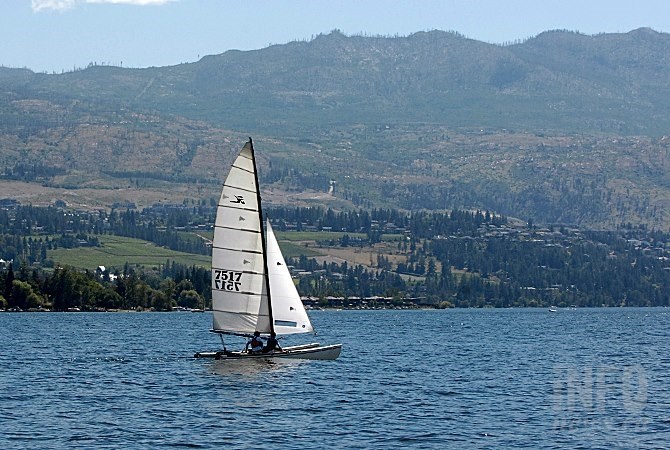
FILE - A sail boat can be seen on Okanagan Lake in the Central Okanagan in July 2015. Despite sitting smack dab in a region beset by a level four drought, Okanagan Lake is not doing too badly when it comes to water level, at least at first glance.
(ADAM PROSKIW / iNFOnews.ca)
August 27, 2015 - 2:30 PM
OKANAGAN - Despite sitting smack dab in a region beset by a level four drought, Okanagan Lake is not doing too badly when it comes to water level, at least at first glance.
Estimates from the natural resources ministry predict the lake won’t go down as far as it has in previous drought years. It's currently 15 centimetres below its Sept. 1 target level for this year, well above previous drought years in 2009 (24 cms below target) and 2003 (42 cm below target), according to spokesperson Greig Bethel.
Where the problem will lie is next year should current long range weather forecasts hold out and drought continues. With reservoirs depleted and little to replenish them, communities in the region could find themselves under severe water restrictions come next summer’s high demand season.
Brian Symonds oversaw the management of Okanagan Lake water levels for the province for many years and says several factors must be taken into account.
“The lake has fallen a little bit faster than normal despite efforts to curtail how much water was being released from the lake," he says. "It’s certainly been a challenging year. But it’s not the most extreme we ever had.”
Despite predictions of a warm and dry El Nino year, Symonds says forecasts are only predictions.
“There is always that uncertainty although that’s the way things are trending," he says. "We need to be looking at the period in the fall when the snowfall starts at higher elevations through to the spring. We will get a better sense of where we are at once the irrigation season ends in September and demand slips back to around base level.”
Still, Symonds says people should watch their water usage, even if the current restrictions are eased.
“This is a year to watch and learn from and hopefully it makes people think more about it when they see a long dry spell. The more we can conserve now, the better for all interests and for next year.”
To contact the reporter for this story, email John McDonald at jmcdonald@infonews.ca or call 250-808-0143. To contact the editor, email mjones@infonews.ca or call 250-718-2724.
News from © iNFOnews, 2015